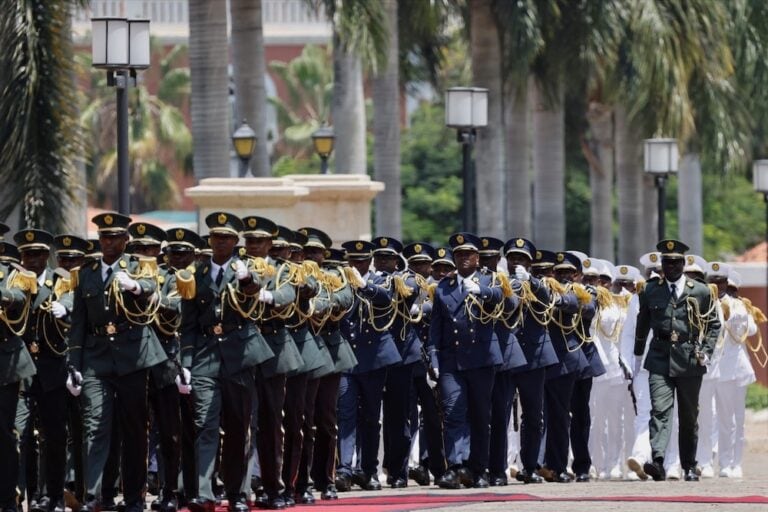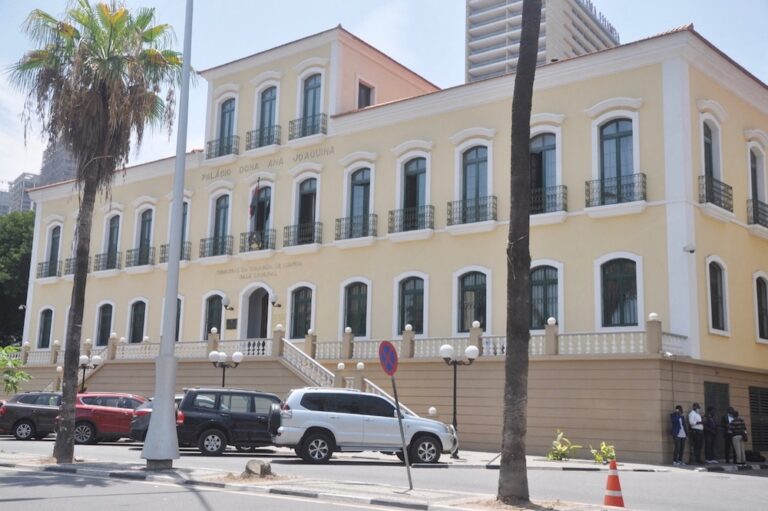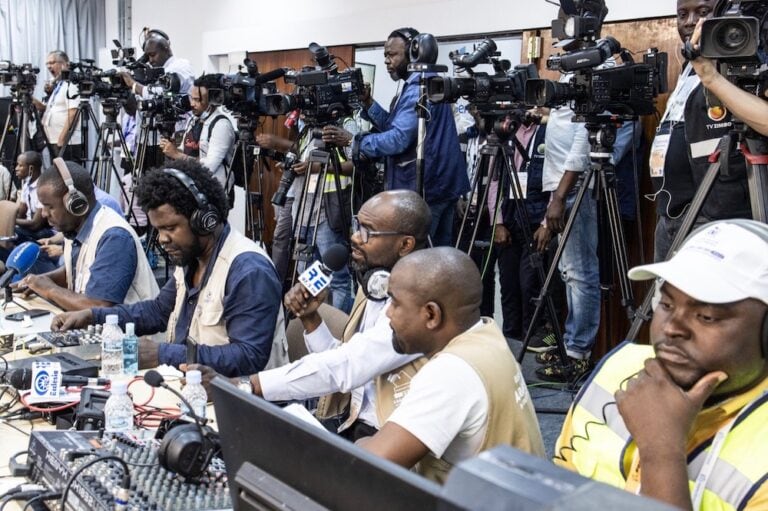(MISA/IFEX) – Journalists Paulo Juliao and Emanuel da Mata from the independent church-owned Radio Ecclesia were released on Tuesday 10 August 1999, some nine hours after being arrested by officers of the police’s Criminal Investigation Department (DNIC). The two were arrested shortly after the station re-broadcast a British Broadcasting Corporation (BBC) interview with Union for […]
(MISA/IFEX) – Journalists Paulo Juliao and Emanuel da Mata from the
independent
church-owned Radio Ecclesia were released on Tuesday 10 August 1999, some
nine
hours after being arrested by officers of the police’s Criminal
Investigation Department (DNIC). The two were arrested shortly after the
station re-broadcast a British Broadcasting Corporation (BBC) interview with
Union for the Total Independence of Angola (UNITA) rebel leader Jonas
Savimbi. An earlier broadcast of the interview, on Monday 9 August, led to
the arrest and brief detention of Juliao and two other journalists, Laurinda
Tavares and Filipe Joaquim, as well as a search of the radio studios.
**Updates IFEX alerts of 11 August and 10 August 1999**
On 10 August, the DNIC also issued orders for the local BBC correspondent,
Reginando Silva, as well as three journalists from state television TPA,
Nelson Rosa, Manuel da Silva and Jose Maria, to report to DNIC headquarters.
The TPA reportedly also broadcast the Savimbi interview on 9 August. All
four journalists reported to DNIC headquarters, and following brief
questioning they, along with Juliao and Da Mata from Radio Ecclesia, were
released.
In a 10 August 1999 press release from the Police General Command, the
police said the journalists had been taken in for questioning because both
Radio Ecclesia and the TPA had committed a crime against the internal and
external security of the state by broadcasting the Savimbi interview. The
police statement went on to say that Radio Ecclesia and the TPA had
contravened Articles 8 and 9 of Law 7/78 of 1978 and that investigations
would continue to “clarify the facts and the true intentions that led to
the publication of the interview”.
The director of MISA-Angola, Jorge Silva, told MISA that Law 7/78, also
known as the Law on Crimes against State Security, was a notorious law
enacted shortly after a failed coup attempt in 1977. In terms of this law,
crimes against the ruling party were incorporated into crimes against state
security. Silva pointed out that this law went contrary to Article 35 of the
Constitution, which guaranteed the right to freedom of expression. The
Constitution was adopted in 1992, however, in the absence of a functioning
Constitutional Court in Angola, the law cannot be challenged.
In a related development, the Director of Radio Ecclesia, Antonio Jaka, told
MISA-Angola that the police had forced him to sign a bond in terms of which
the station would never broadcast any material featuring UNITA and Savimbi
without the authorisation of the Ministry of Interior. Jaka added, “The
catholic station has started consultations with its lawyers in order to
identify the legal implications of that measure before it takes a legal
action in defence of its interests.”
In another development, the Wednesday 11 August edition of the bi-weekly
“Folha 8” was forced to self-censor after carrying a report about the
Savimbi interview. The article in question was crossed out with a banner
reading “censored” across it.
Background Information
Four DNIC officers raided the Radio Ecclesia studio some fifteen minutes
before the evening news service on 9 August with warrants of arrest for
Juliao and Da Mata. The officers also had warrants to search and confiscate
the material containing the BBC interview with Savimbi. The officers ended
up detaining Juliao and the two other journalists, Laurinda Tavares and
Filipe Joaquim, in place of Da Mata, who was absent.
The three were held at the DNIC for four hours and were interrogated
simultaneously, but in different rooms. They were released by midnight. The
journalists later said that they were asked questions about their personal
life, political affiliation and the objectives of their action. Juliao said
he was accused of allowing the dissemination of dangerous information and
threatening public security, while the others were accused of keeping
dangerous information.
On 10 August, shortly after noon, Juliao was re-arrested along with Da Mata,
again by DNIC agents, after the station again broadcast the BBC interview
during its 12:00 p.m. (local time) news service.
The government of Angola has repeatedly tried to prevent the media from
giving coverage to the rebel UNITA movement. In January, the managing
director and director of the private commercial FM Radio Morena (in Benguela
province), Jose Cabral Sande and Jose Manuel Alberto, were arrested when the
police raided the studios soon after the station had rebroadcast a news
programme from Radio Televisao Portuguesa (RTP) featuring the Secretary
General of UNITA. By order of the General Staff of the Army, the two were
held at a local police station for “disobedience and offences against the
head of state”. The case was taken to court and the two journalists were
released unconditionally because of insufficient evidence.
In February, Radio Ecclesia, was forbidden from broadcasting the Africa
programme of the Portuguese radio Renasenca on three separate occasions, as
the reports contained material concerning the fighting between the Angolan
forces and UNITA and featured members of UNITA’s leadership.
A full chronology of incidents involving media workers in Angola since
January 1999 can be found on the Internet at:
http://www.misanet.org/alerts/19990707.angola.0.html


